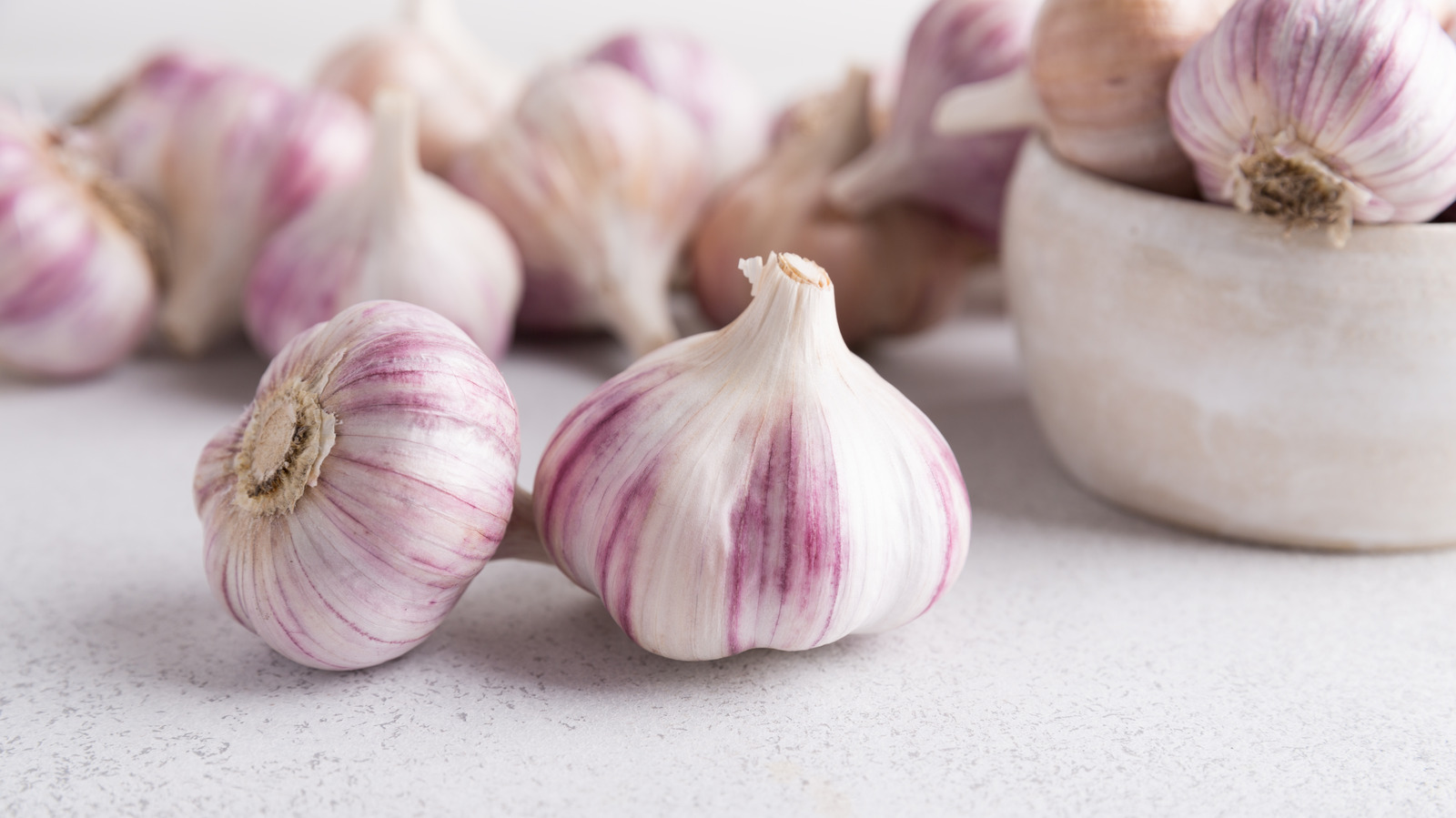
Beloved the world over for its ability to transform any dish, garlic is foundational to many cuisines. Its exceptionally strong flavor, fragrance, and medicinal properties set it apart from other vegetables, and it frequently appears in common folklore. Tales of the allium's curative abilities date back to Ancient Greece, when people relied more heavily on food as medicine.
Today, many of those old legends linger in our collective knowledge, coloring what we think we know. So which garlic myths are actually true? Garlic is a nutritional powerhouse, with beneficial levels of several minerals, including potassium, zinc, selenium, and manganese. It's also known to have antioxidant, anti-inflammatory, and lipid-lowering effects, and is sometimes referred to as a nutraceutical.

Garlic has been the focus of many clinical trials, which have proven garlic to have an outsized ability to treat a number of diseases, especially those related to cardiovascular health. But in most cases, it must work in tandem with medication and other therapies to be effective. Simply put, garlic offers a wealth of benefits, but is not the magic cure-all of old wives' tales, and any medical claims with roots in the supernatural are likely overblown.
Even if you don't believe that it grants good luck or repels vampires, you might be surprised to learn how many preconceived notions about garlic are based on those old ideas. Here are ten popular myths about garlic that it's time to move on from. Myth: Garlic acts as mosquito repellent when ingested Science tells us that garlic's anti-inflammatory properties can improve the health of our blood, and personal experience tells us that mosquitos consume our blood.
We also know that mosquitos hate strong scents, so the theory that eating notoriously pungent garlic could repel them makes sense. Unfortunately, it's not true. In 2005, a group of researchers at the University of Connecticut conducted an experiment whose findings were later reported by The New York Times .
The study required people to eat a lot of garlic, and then a placebo, while being exposed to mosquitos to determine whether or not the food had an effect. After what we can only imagine was a miserable experience, the researchers declared the theory to be false. While garlic breath may turn other humans away, it sadly won't do the same to mosquitos.
On the bright side, a study published in the journal Heliyon found that applying garlic topically, like spraying it onto clothing, can actually deter mosquitos, while garlic mixed with peppermint has strong anti-fungal properties. You may not like the smell, but neither will those flying, biting bugs. Myth: Garlic will detoxify your blood The link between garlic consumption and blood health is frequently studied, and is undoubtedly what fuels many prevailing myths (including those about vampires).
Studies have shown that garlic's therapeutic properties can be beneficial for decreasing serum cholesterol and triglyceride, aiding in the prevention and treatment of cardiovascular disease. But while it's true that eating garlic as part of a health-focused lifestyle may help lower cholesterol and blood pressure, there is no conclusive evidence that it has a detoxifying effect. What's more, to have the desired effect, garlic would most likely need to work in tandem with other measures, so this is one myth that's only partially true.
No singular food has been proven to detox the blood. Rather, experts agree that the best way to keep our blood healthy is the same way we keep every other part of our bodies healthy: By eating plenty of fruits and vegetables, drinking lots of water to help our kidneys function and properly eliminate waste, and exercising to optimize blood flow. Incorporate appropriate amounts of garlic into your cooking, especially as a replacement for excess salt, and you can feel good about how you're caring for your blood health.
Thankfully, eating more garlic is easy and tasty . Myth: Garlic prevents colds when worn An apple a day keeps the doctor away. Carrots improve eyesight.
Starve a fever, feed a cold. There's no shortage of old wives' tales about health and nutrition. Oftentimes, the validity of these claims is murky, based on a semblance of truth that's been twisted over time.
A prime example of this phenomenon is the widely held belief that wearing garlic prevents a cold. According to European folklore, the mere presence of garlic in the home can ward off the evil eye and keep away evil entities like werewolves, vampires, and devils. This is connected to the idea that mosquitos act as vampires, and led to many families hanging bouquets of garlic in windows and even rubbing garlic around doorways and chimneys.
It's not hard to make the leap to wearing garlic on our bodies to similarly protect against germs, but there's no scientific evidence that this works. Garlic's antimicrobial and antiviral properties have been extensively tested against the common cold, but evidence remains inconclusive, even in studies where the garlic is consumed. It's therefore unrealistic to think that hanging garlic around our necks would do much to keep us healthy.
Myth: Garlic alone will work as a weight-loss aid Allicin is a sulfur-containing compound found abundantly in garlic, and some people posit that since it can suppress appetite and improve metabolism, garlic alone should be an effective weight-loss drug. While the theory may prompt you to try taking garlic extract supplements yourself, you should know that this idea isn't currently backed by science. A randomized double-blind clinical trial, reported in the journal Frontiers in Nutrition , was conducted over two months to test the theory of allium as a weight-loss aid, but in addition to taking the supplement, the test group was also put on a low-calorie diet.
While this resulted in a small change to the subjects' gut microbiota and a decrease in BMI, it's not clear how instrumental the garlic was or whether the dietary changes alone would have led to the same outcome. Without additional evidence, there's no way to say for certain whether garlic works as a weight-loss aid without additional lifestyle changes. That being said, for those looking to enhance their diet with nutritious ingredients, garlic is still among the foods to eat every day .
Myth: Garlic can treat ear infections when used whole Ear infections are a common ailment among children, and home remedies frequently call for garlic as a natural infection-fighting ingredient. It's typically used in oil or extract form that's applied to the ear via a dropper, and some say eating garlic can also transfer the allium's widely effective antimicrobial properties. The efficacy of these methods is still debated within the medical community, but experts collectively agree that, despite what any viral internet posts may say, sticking a whole clove of garlic directly into your child's ear is never a good idea.
While many garlic myths are ultimately harmless, this is one that can be dangerous. A clove of garlic can become lodged in the ear, potentially causing damage to the eardrum, leaving a rash or irritation, or even resulting in an additional infection. The likelihood of garlic even reaching the infected area through the ear is extremely low.
To be an effective treatment, the garlic would need to be taken orally or through the blood and at a very high dose. So even if you're able to insert a clove of garlic into your ear and then remove it without issue, it's not worth the effort or risk. Myth: Garlic can cure acne In 2024, a new beauty trend hit social media, telling people to eat raw garlic (by the spoonful or by the whole clove) every day to clear up their hormonal acne.
The reasoning stems from the connection between sebum production in the skin and garlic's known ability to fight inflammation, as well as evidence pointing to how your diet can prevent and treat acne. But while it may sound plausible, and some skincare influencers insist it works, experts argue there's no scientific evidence to back up the claim that garlic can cure acne. The idea that something as accessible as eating raw garlic could be the cure for an affliction as common as acne is exciting, so it's no wonder that the theory quickly spread.
But while it may be perfectly safe to consume moderate amounts of garlic with the intent to improve skin health, going overboard can have its own problems, like bad breath, body odor, and an upset stomach. Moreover, rubbing raw garlic directly onto the skin is never a good idea as it can cause irritation and exacerbate any underlying issues. As part of the ongoing quest to uncover the truth about acne, a related study found that general knowledge about the condition is lacking.
To this day, the exact causes of acne remain unclear, and it's probably not a great idea to get your dermatology tips from people who lack the proper credentials. Myth: Garlic can break a fever There's an old wives' tale that says applying raw garlic to the soles of a child's feet, whether by rubbing directly onto the skin or placing slices in socks, can work to bring down a fever. The reasoning leans on garlic's antibacterial and antiviral properties, and probably also theories of reflexology, but it's not supported by scientific research.
Not only is garlic's fever-reducing ability unproven, but believing otherwise can be dangerous. An illustrative case study published in the journal Pediatric Emergency Care explicitly warns against applying garlic to the feet of a young child, following an example of this method resulting in unintentional injury to the child. According to the case, a 15-month-old's feet were burned after garlic was applied to the skin to treat a fever.
As for ingesting garlic to break a fever, that may be less risky but the claim's equally dubious. While garlic's proven health benefits are many, the ability to reduce a fever isn't among them. Myth: Garlic oil should be stored at room temperature Garlic preserved in oil is a popular cooking ingredient, infusing a meal with bold flavor and beneficial nutrients like calcium, selenium, vitamin B6, and manganese.
But experts warn that home chefs should proceed with caution when preparing and storing homemade garlic oil , because of its significant botulism risk. Unrefrigerated garlic in oil creates an optimal place for common bacteria spores to grow. When exposed to oxygen, the bacteria are harmless to humans, but if deprived of oxygen (for example, by sealing it inside a bottle) and kept at 50 degrees Fahrenheit or above, they can become dangerous.
This is especially hazardous because it doesn't change the smell or taste of the oil, meaning that any developing risk for botulism is difficult to identify. Once you've carefully peeled your cloves of garlic and they're ready to store, a safer way to do so is in vinegar in the fridge. You should keep in mind, though, that this will pickle the garlic (and possibly turn it green or blue in the process).
If that's not what you want, you might prefer to roast your garlic , or make homemade garlic confit that can be safely stored in the fridge for up to two weeks. Myth: Garlic should be eaten as fresh as possible While most fruits and vegetables are best enjoyed straight from the garden, garlic is a strange exception. After it's harvested, bulbs of garlic should be cured for about two weeks in a cool, dry place with good air circulation.
While there are different methods, farmers typically hang the garlic in bunches of four to six in a lengthy process that can be frustrating to the home garlic grower, as the plant already takes quite a while to mature. But this step is vital for preventing mold and rot, and for enhancing the flavor of the garlic. It's also not the only time the allium needs to rest.
The "10-minute rule" is recommended by some people, including a few food scientists, who insist on waiting after chopping to throw garlic into a hot pan. This is key to allowing the garlic's enzymes to form allicin, one of the chemical compounds that makes garlic so nutritionally beneficial. Forgetting this step is actually one of the most common mistakes people make when cooking with garlic .
To better reap its benefits, chop your garlic first and let it sit while you prepare other ingredients. Myth: You can't have too much garlic Yes, delicious and nutritious garlic is a cornerstone of many cuisines, to the point where fans will tell you that you can never have too much. The truth is, though, like everything else, garlic should be enjoyed in moderation.
Eating too can have negative consequences like heartburn, indigestion, and, of course, bad breath. But a few people should be careful of other unintended consequences of garlic. Those on medications like cyclosporine or blood thinners should be aware that large amounts of garlic can exacerbate side effects and increase bleeding.
This is likely due to the fact that garlic is antithrombotic, which means it may prevent necessary blood clots from forming. More common complications include gastrointestinal issues and the dreaded "garlic breath" that's a direct result of sulfur compounds. The latter is due to garlic's high fructan content, which can cause bloating and gas in some people.
Those adhering to a low FODMAP diet and those with gastroesophageal reflux disease (GERD) should be careful not to eat excessive quantities of garlic. Thankfully, a little goes a long way. To enjoy all of garlic's health benefits, all you need is one or two cloves daily.
That might not be enough to kill a vampire, but it'll be plenty in a balanced diet..














